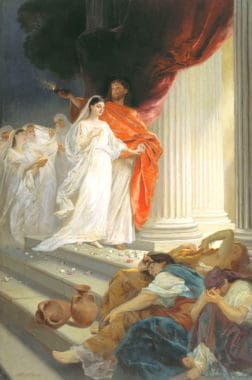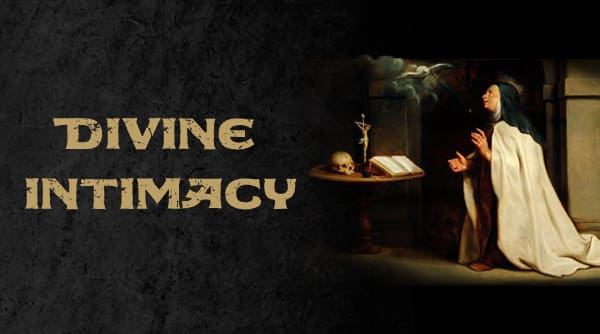Prudence
Presence of God – Show me, O Lord, the way of true prudence.
MEDITATION
If we wish to attain union with God, our whole life should be directed toward Him; and as our life is made up of many acts, we should see that each one is a step forward on the way that leads to Him. Supernatural prudence is that virtue which suggests to us what we should do and what we should avoid in order to reach the goal we have set for ourselves. If we wish to reach union with God, prudence tells us to conform ourself in everything to His will, to detach ourself from all things, even the least, if it be contrary to His divine will. If we wish to become a saint, we must perform these acts of charity and generosity without recoiling from the sacrifice. If we wish to become a soul of prayer, we must strive to be recollected, to avoid useless conversation, to mortify our curiosity, and to apply ourself diligently to prayer. Thus prudence prescribes what we ought to do and what we ought to avoid, whether in view of our final end—union with God, sanctity—or in view of an immediate goal—such as the acquisition of particular virtues—which, however, always must be ordered to our final end.
 The parable of the wise and foolish virgins effectively demonstrates the need of this virtue. They all slept while waiting for the bridegroom to come; when he arrived, the first five were admitted into the banquet hall, the other five were refused simply because they had not had the prudence to provide themselves with sufficient oil to fill their lamps. And the parable concludes: “Watch ye therefore, because you know not the day nor the hour” (Matthew 25:13). Supernatural prudence counsels us first of all to make good use of the time God gives us and the opportunities He offers us to practice virtue, because “the night cometh, when no man can work” (John 9:4). When, through indolence or carelessness, we miss an opportunity to do a good deed, it is lost forever; others may present themselves later, it is true, but that one will never return again.
The parable of the wise and foolish virgins effectively demonstrates the need of this virtue. They all slept while waiting for the bridegroom to come; when he arrived, the first five were admitted into the banquet hall, the other five were refused simply because they had not had the prudence to provide themselves with sufficient oil to fill their lamps. And the parable concludes: “Watch ye therefore, because you know not the day nor the hour” (Matthew 25:13). Supernatural prudence counsels us first of all to make good use of the time God gives us and the opportunities He offers us to practice virtue, because “the night cometh, when no man can work” (John 9:4). When, through indolence or carelessness, we miss an opportunity to do a good deed, it is lost forever; others may present themselves later, it is true, but that one will never return again.
COLLOQUY
“O my God, a soul who loves You listens no more to the suggestions of human prudence. Faith and love alone influence her, making her despise all earthly things, holding them to be worthless, as indeed they are. She cares not for any earthly good, being convinced that all is vanity. When she finds that by doing something she can serve You better, she listens to no objections but acts at once, for she understands that her profit consists entirely in this” (cf. Teresa of Jesus Conceptions of the Love of God 3).
“O Lord, if I wish to be a saint, I must live entirely on a supernatural plane, always remembering that ‘whatsoever is not God, is nothing,’ as the author of the Imitation says; consequently, I must leave all things or make use of all to come to You.
“If I do not watch over myself, I can materialize even spiritual things by considering everything superficially, under its human aspect. Alas! O Lord, I know that at times I have acted in this way.
“Oh no! a life spent for You is so great, so beautiful! But it is not great because of any extraordinary deeds, but rather because of the love and fidelity with which I must inform even the least important duties, which transforms these least actions, as well as all my daily occupations; it is great because of the apostolic intentions which vivify my prayers and sacrifices. Teach me, O Lord, to give the greatest amount of love to each instant, to make eternal every passing moment, by giving it the added value of charity” (cf. Sr. Carmela of the Holy Spirit, O.C.D.).
+
 Note from Dan: This post on prudence is provided courtesy of Baronius Press and contains one of two meditations for the day. If you would like to get the full meditation from one of the best daily meditation works ever compiled, you can learn more here: Divine Intimacy. Please honor those who support us by purchasing and promoting their products.
Note from Dan: This post on prudence is provided courtesy of Baronius Press and contains one of two meditations for the day. If you would like to get the full meditation from one of the best daily meditation works ever compiled, you can learn more here: Divine Intimacy. Please honor those who support us by purchasing and promoting their products.
Art for this post on prudence: The Parable of the Wise and Foolish Virgins, Ernest Karlovich Lipgart, 1886, PD-US author’s life plus 70 years or less, Wikimedia Commons. Father Gabriel of St. Mary Magdalen, mirror from open source material.




